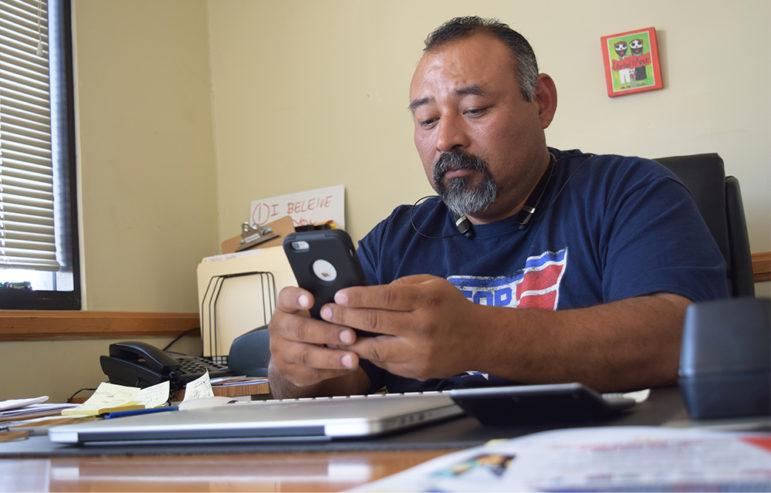
Rachel Cohrs
Alex Sanchez, the founder of Homies Unidos, immigrated to Los Angeles as a child and was later involved with gangs. He decided to help support youth in areas where he had struggled.
LOS ANGELES — Alex Sanchez knows the temptations of joining gangs for young Central American immigrants.
He fled to the United States in 1979 as an unaccompanied minor (he was 7, his brother 5) to escape the Salvadoran civil war. Eventually he got involved in gang violence, went to prison and was deported before returning to the United States illegally. He was granted political asylum in 2002 and in 2006 became the executive director of Homies Unidos, a nonprofit violence- and gang-prevention organization in Los Angeles.
 “You’re looking at the gangs having fun, going out, and the girls and cars, and you’re stuck. You don’t know what to do. You walk outside and there’s the gangs, there’s drugs, alcoholism, prostitution and police harassment,” Sanchez said.
“You’re looking at the gangs having fun, going out, and the girls and cars, and you’re stuck. You don’t know what to do. You walk outside and there’s the gangs, there’s drugs, alcoholism, prostitution and police harassment,” Sanchez said.
While it’s certain that some Latino youth — born in the United States or not — are in the juvenile justice system across California, it is anyone’s guess how many and how their journey through the system affects them.
Assemblywoman Nora Campos, a Democrat, introduced Assembly Bill 1998 to start the process of standardizing juvenile justice-related data collection across California’s 58 county probation departments. Gov. Jerry Brown signed the bill into law Friday. It will bring involved groups together to discuss guidelines counties should follow when collecting data about youth.
California’s problem with juvenile justice data
About a year ago, activist Marcia Rincon-Gallardo wanted to start researching how to best help Latino girls who end up in the juvenile justice system.
She then realized the data she was looking for didn’t exist.
Rincon-Gallardo, founder and executive director of Silicon Valley-based juvenile justice think tank Noxtin, found it nearly impossible to develop recommendations to improve youth wellness in the system without having a way to prove problems exist.
Although Latinos comprise 39 percent of California’s population according to the Pew Research Center, they are essentially invisible in data collected about the juvenile justice system.
“In nonprofits and the public sector, we understand Latinos are incarcerated. We don’t know how many black and white Latinos are incarcerated … we don’t know how things are going in their life later,” said Alejandro Gutierrez, a legislative aide for Campos.
Based on current metrics, the system can’t track probation violations, institutional placements, probation length, adult court disposition, recidivism or long-term health and wellness outcomes for any youth.
If the government and nonprofit organizations can’t track how involvement with the juvenile justice system impacts youth in the long term, there is no way for them to make informed policy decisions to improve the system.
“We have to be able to measure how effective we are being,” Rincon-Gallardo said. “We can’t be pouring money into a system that isn’t working for our kids.”
For Latino youth, the issue is only compounded because not all counties report accurate ethnicity data.
“The way they do it on the police report is [officers] look at a kid and fill the box in,” Rincon-Gallardo said.
She wasn’t the first to recognize this issue. After county-based realignment began in the mid-2000s, counties got grants to help them handle the influx of young people moving to county institutions and probation from the state system. The state auditor released a scathing report in 2011 about the lack of goals and performance data attached to one of those grants.
The auditor’s report stated that the “limited — and potentially misleading — juvenile justice data that are currently available makes any measurement of realignment outcomes arbitrary.”
Without measuring outcomes, it’s difficult for nonprofits or government agencies to determine whether to continue with a course of action or to make changes.
“When we talk about having data, we want it so we can know where the barriers and opportunities for system improvement are around policy and practice,” Rincon-Gallardo said.
Solving the data collection issue proves challenging
However, improving data collection practices isn’t as simple as adding a checkbox on police report forms. Counties have independently formed their own systems to process youth in the juvenile justice system, which has resulted in a wide variety of practices. Unlike other states, California doesn’t have a state Department of Juvenile Justice. This decentralization makes it hard to impose uniform standards across the state.
Danielle Sanchez, spokeswoman for Chief Probation Officers of California, said her organization is supportive of “data-driven decision making,” but that county probation departments need to be involved in developing guidelines to be sure they are practical to implement.
“We have to be balancing our desire for data with time spent working with kids. We should not be collecting more information for the sake of collection because that takes away from spending time on the youth,” she said.
The bill will immediately impact reporting standards for state juvenile justice grants. Some outdated standards will be removed and new requirements will be added.
In the future, the probation officers, the Board of State and Community Corrections, rehabilitation advocates and others will gather to develop nonenforceable, optional guidelines for how data is supposed to be collected statewide.
Rincon-Gallardo was hoping for authority to mandate that county probation departments implement the guidelines, but that was not in the final legislation.
“Recommended guidelines are not enough in my mind, but it is what it is,” she said.
Developing details of the standards has been postponed until all the stakeholders can meet. It is possible that once standards are developed, they could be mandated in another bill later on, Rincon-Gallardo said. While the details have been contentious, Gutierrez said the overall idea has received wide support.
“When we introduced this, everyone was on board,” Gutierrez said. “The question was, ‘Why does California not already have this?’”